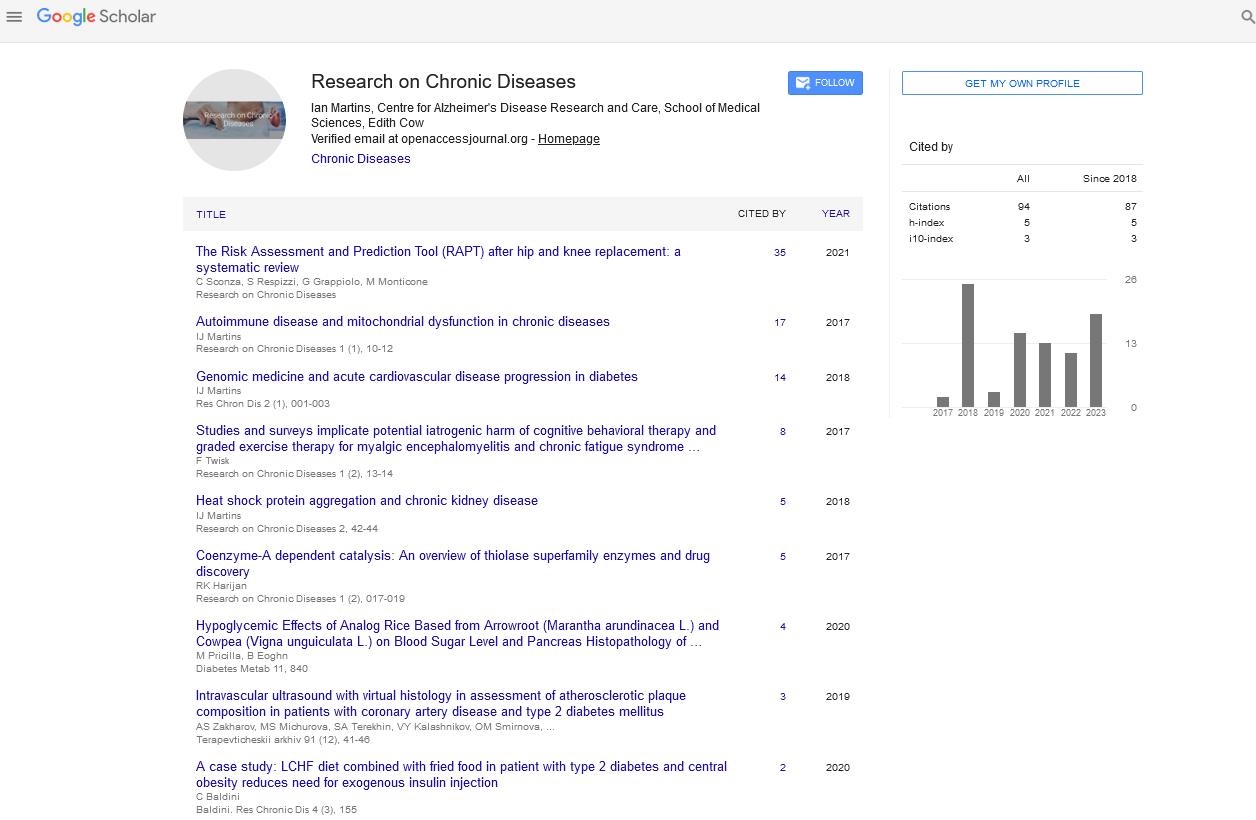Perspective - Research on Chronic Diseases (2024) Volume 8, Issue 5
Understanding Inflammatory Bowel Disease (IBD): A Comprehensive Overview
- Corresponding Author:
- Kouri Miller
Department of Gastroenterologgy,
University of Bedford,
Bedford,
South Africa
E-mail: kouri@gmail.com
Received: 04-Jul-2024, Manuscript No. OARCD-24-140648; Editor assigned: 09-Jul-2024, PreQC No. OARCD-24-140648 (PQ); Reviewed: 23-Jul-2024, QC No. OARCD-24-140648; Revised: 01-Oct-2024, Manuscript No. OARCD-24-140648 (R); Published: 29-Oct-2024, DOI: 10.37532/ OARCD.2024.8(5).234-235
Introduction
Inflammatory Bowel Disease (IBD) represents a complex group of chronic inflammatory disorders primarily affecting the gastrointestinal tract. This condition encompasses two main forms: Crohn’s disease and ulcerative colitis, both of which exhibit distinct characteristics in terms of symptoms, affected areas of the digestive system, and long-term management challenges. While the exact causes of IBD remain elusive, a combination of genetic predisposition, environmental factors, and dysregulation of the immune system are believed to play significant roles in its development.
Description
What is inflammatory bowel disease?
IBD is characterized by recurring inflammation and damage to the lining of the digestive tract. This chronic inflammation can lead to various symptoms, including abdominal pain, diarrhea (often bloody), weight loss, fatigue, and in severe cases, complications such as bowel obstruction or fistulas. Understanding the differences between Crohn’s disease and ulcerative colitis is crucial:
Crohn’s disease
Affected areas: Can occur anywhere along the gastrointestinal tract from mouth to anus, often involving deeper layers of the bowel wall.
Symptoms: Abdominal pain, diarrhea, fatigue, and sometimes complications such as abscesses or fistulas.
Treatment: Management includes anti-inflammatory medications, immune suppressants, and in some cases, surgical intervention to remove affected bowel segments.
Ulcerative colitis
Affected areas: Typically limited to the colon (large intestine) and rectum, affecting only the innermost lining of the bowel.
Symptoms: Bloody diarrhea, abdominal cramps, urgency to defecate, and in severe cases, increased risk of colon cancer.
Treatment: Treatment focuses on anti-inflammatory drugs, immune suppressants, and in some cases, surgery to remove the affected colon.
Diagnosis and management
Diagnosing IBD involves a combination of clinical evaluation, imaging studies (such as endoscopy and imaging scans), and laboratory tests to rule out other conditions and confirm the presence of chronic inflammation. Managing IBD requires a multidisciplinary approach involving gastroenterologists, dietitians, and sometimes surgeons. The goals of treatment include inducing and maintaining remission, alleviating symptoms, and preventing complications.
Aminosalicylates: Mild to moderate cases are often treated with these anti-inflammatory drugs.
Corticosteroids: Used to reduce inflammation during flare-ups but not suitable for long-term use due to side effects.
Immunomodulators: Drugs such as azathioprine or methotrexate help suppress the immune response.
Biologics: Targeted therapies like TNF inhibitors (infliximab, adalimumab) or integrin inhibitors (vedolizumab) are used for moderate to severe cases.
Lifestyle and dietary modifications
Nutrition: Some individuals benefit from specific diets, such as low-residue or low-FODMAP diets, to manage symptoms.
Smoking Cessation: Smoking is a known risk factor for Crohn’s disease and can exacerbate symptoms.
Stress Management: Techniques like mindfulness, yoga, or therapy can help reduce stress levels, which may influence symptom severity.
Surgical interventions
Resection: Surgical removal of severely affected bowel segments in Crohn’s disease to alleviate symptoms or complications like strictures.
Colectomy: Complete removal of the colon in cases of severe ulcerative colitis that are unresponsive to medications.
Challenges and future directions
Living with IBD presents numerous challenges beyond physical symptoms. Patients often face psychological stress, social stigma, and lifestyle limitations due to unpredictable symptoms and the need for ongoing medical care. Research into new treatment modalities, such as personalized medicine approaches based on genetic profiling, microbiome research, and targeted therapies, offers hope for improved outcomes and better quality of life for individuals with IBD
Conclusion
Inflammatory bowel disease is a chronic condition that significantly impacts the lives of affected individuals. While current treatments can effectively manage symptoms and induce remission in many cases, ongoing research and patient-centered care are essential to further improve outcomes and enhance the quality of life for those living with IBD. Through a combination of medical advancements, supportive care, and patient empowerment, the future holds promise for better management and understanding of this challenging disease.
